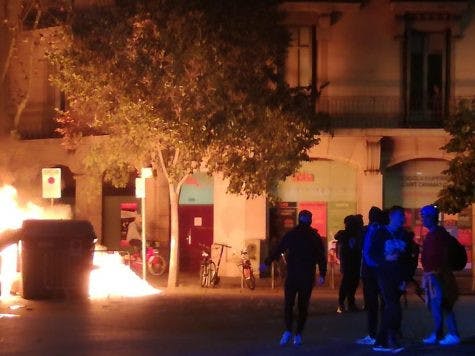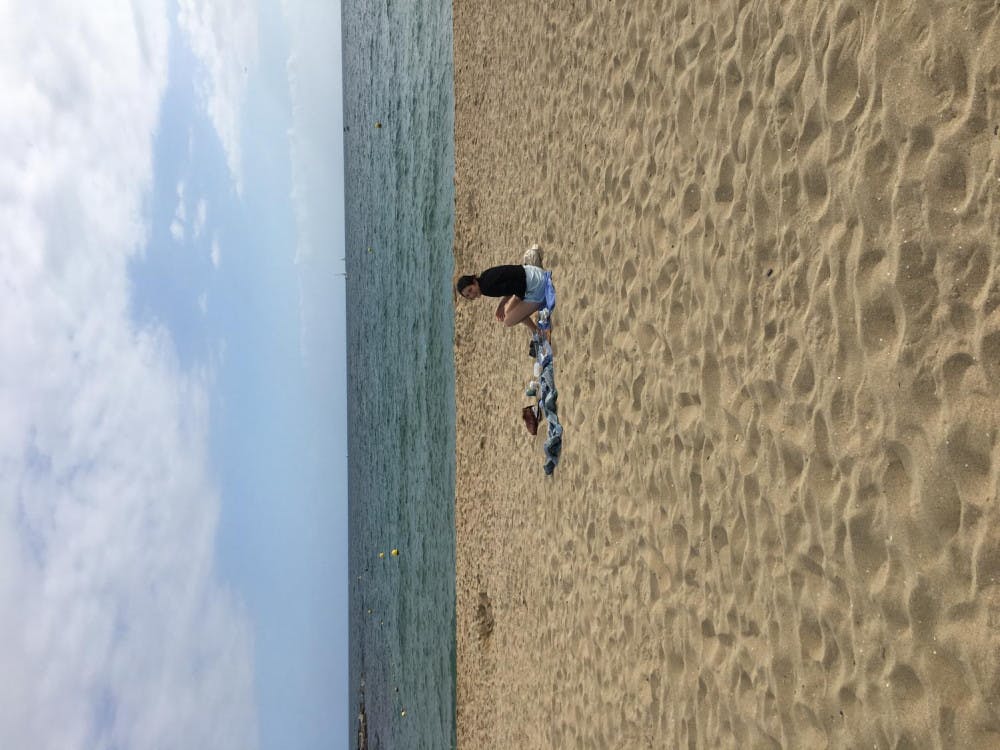I often wind up at the mouth of the Mediterranean on Sunday nights. The 30 minute walk from my apartment to Mar Bella beach was the first route I memorized. As someone who scoffs at google maps but has possibly the worst sense of direction ever, this was a symbolic feat. Despite leaving a permanent trail of sand through my cramped apartment, my weekly chats with the sea have become grounding rituals and have marked my time in Barcelona.
My first Rosh Hashanah away from Vermont, I ate apples and honey at the beach. When a friend visited last month, I insisted we plunge into the ocean before catching the last train home. And, it has become my preferred place to call my mom, meet new friends, or star gaze.
I spent my first night at the beach during La Mercè, a week long festival that celebrates Catalan culture and traditional art. As one of three international students at Eolia Conservatory of Dramatic Art, La Mercè was the perfect introduction to Barcelona. Celebrating with my Catalan classmates gave me a deep appreciation for my temporary home, a city that is bursting with culture and beauty.
After watching a dance show outside the Arc de Triomf and scarfing down a plate of patatas bravas — crispy potatoes and aioli (in other words, my current replacement for Grille fries), my class headed to Mar Bella. We put down our blankets and began an obligatory “get to know you” round of Spanglish “never have I ever.” But after several calimochos (a surprisingly tolerable combination of cheap red wine and Coca Cola), the conversation turned more serious. My classmates’ love for Catalonia is contagious, but they also fear for its future and the state of democracy in Spain.
Catalonia has a complicated political history, fraught with oppression and cultural silencing. As Spain’s financial crisis has pushed Catalonia into debt, the desire to secede has become urgent. Catalonia generates tremendous revenue for Spain (at least relative to its size) and many feel that the partnership between the region and the country is unequal. In 2017, Catalan Seperatist leaders held an independence referendum, and 90% voted to cut ties with Spain. However, the referendum saw low voter turnout, and was deemed illegal by the central Spanish government. Madrid imposed direct rule over Catalonia, and protest erupted in response. In 2017, nine Catalan leaders (charged for rebellion, sedition and misuse of public funds) were detained for pre-trial. My classmates explained that this was a breach of laws protecting free speech. Thus ensued a fight to defend democracy in Spain, rather than simply an argument over Separatism.

Several weeks ago, the nine Catalan leaders were sentenced to 100 cumulative years in prison. The news broke during my Monday morning Shakespeare seminar. Mentally, I had left class 15 minutes prior and was silently rehearsing a scene for my next class. I snapped to attention when news alert pings dominoed through the classroom. Democracy had been challenged and Barcelona’s political climate would change indefinitely. Protests began immediately, rendering my internal scene study trivial. Classes halted the 72 hours preceding a general strike. Students led the movement, staging demonstrations on an unprecedented scale. That week trash cans burned around my block, as marching continued through the night and helicopters flew overhead.
With classes canceled, I had time to fill. I protested with my classmates, at their request. But I also drank coffee with international friends, among whom the political crisis became background noise. Inhabiting these two seemingly different worlds has been confusing, and raised questions about my role as a foreigner. Though a fight for democracy is at the heart of the movement, it feels complex to march along seas of Catalan flags, far from the security of home. Still, disengaging from the conflict is impossible when smoke spirals toward my window and sirens scream through the night.
The beach became eerily quiet the week of heavy protesting. I wish I could say the silence has given way to profound personal discovery, or that a higher calling has led me to fight for democracy and change. I haven’t settled on anything that concrete yet. But, I have come to realize that outside isolated communities (like Middlebury) there is no place for apathy.
To enjoy Catalonia’s beaches, I must also try to understand the needs of its people.
My class celebrated our friend’s birthday at Mar Bella last weekend. The scene echoed the night of La Mercè, and it momentarily felt like life had returned to normal since the sentencing. But in the midst of political revolution, there is no “normal.” The protests have altered the quality of life in Barcelona. Though the political current of the city has become less predictable, I still feel constantly grateful to be here. Catalonia’s beauty warrants a fight. Although I still don’t have answers about my personal role in the struggle right now, I do know my heart is with the Catalan youth who are brave, ready for change and willing to fight for it.
Becca Berlind is a member of the class of 2021. She is studying in Barçelona, Spain for the fall of 2019.
Foreign correspondent: Becca Berlind in Barcelona

COURESTY BECCA BERLIND
Comments



